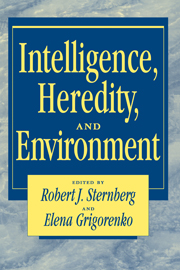Book contents
- Frontmatter
- Contents
- List of contributors
- Preface
- Part I The nature–nurture question: New advances in behavior-genetic research on intelligence
- Part II Novel theoretical perspectives on the genes and culture controversy
- 6 The invalid separation of effects of nature and nurture: Lessons from animal experimentation
- 7 Between nature and nurture: The role of human agency in the epigenesis of intelligence
- 8 A third perspective: The symbol systems approach
- 9 A cultural-psychology perspective on intelligence
- 10 A bio-ecological model of intellectual development: Moving beyond h2
- 11 An interactionist perspective on the genesis of intelligence
- Part III Specific issues in the nature–nurture controversy
- Part IV Integration and conclusions
- Name index
- Subject index
9 - A cultural-psychology perspective on intelligence
Published online by Cambridge University Press: 05 June 2012
- Frontmatter
- Contents
- List of contributors
- Preface
- Part I The nature–nurture question: New advances in behavior-genetic research on intelligence
- Part II Novel theoretical perspectives on the genes and culture controversy
- 6 The invalid separation of effects of nature and nurture: Lessons from animal experimentation
- 7 Between nature and nurture: The role of human agency in the epigenesis of intelligence
- 8 A third perspective: The symbol systems approach
- 9 A cultural-psychology perspective on intelligence
- 10 A bio-ecological model of intellectual development: Moving beyond h2
- 11 An interactionist perspective on the genesis of intelligence
- Part III Specific issues in the nature–nurture controversy
- Part IV Integration and conclusions
- Name index
- Subject index
Summary
Those psychologists who do work with human beings may fail entirely to see the relevance of culture.… [Psychologists accept that while everyone has culture, it is mainly relevant elsewhere where it produces certain exotic effects that anthropologists study. It is as if others have culture while we have human nature.
(Schwartz, 1992, p. 329)This chapter examines the role of culture in intelligence and the implications that a cultural perspective has for understanding hereditary and environmental influences on intelligence. This discussion builds on work being conducted in the interdisciplinary perspective of cultural psychology (Bruner, 1990; Cole, 1990; Miller, 1994a; Shweder, 1990; Shweder & Sullivan, 1993). From this perspective, psychological processes are viewed as, in part, contextually and culturally constituted, if not also as contextually and culturally variable. Culture is seen as influencing which behaviors are considered to be intelligent, the processes underlying intelligent behavior, and the direction of intellectual development. It thus is essential to any theory that is oriented to understanding the respective contributions of hereditary and environmental factors in intelligence.
Traditionally, cultural considerations have tended to be taken into account in theories of intelligence solely from an ecological perspective, if at all (e.g., Berry, 1976; Dasen, Berry, & Witkin, 1979). From this ecological perspective, cultural forms are treated exclusively in functional terms as adapted to objective constraints given in the physical setting or in the social structure. While not denying the importance of an ecological view of culture, this chapter argues that cultural factors need to be understood as influences on intelligence that vary independently of ecological constraints.
- Type
- Chapter
- Information
- Intelligence, Heredity and Environment , pp. 269 - 302Publisher: Cambridge University PressPrint publication year: 1996
- 2
- Cited by

